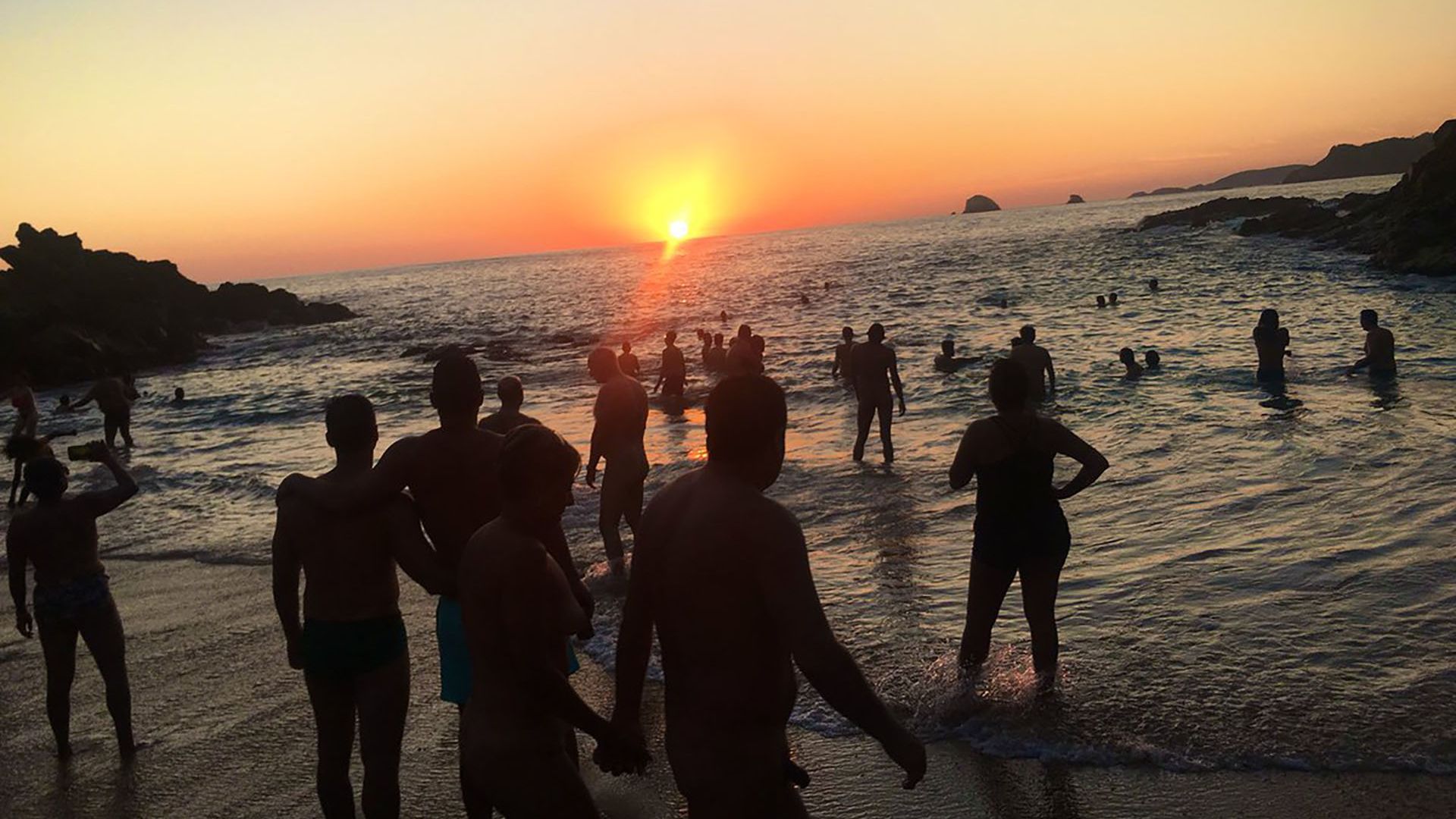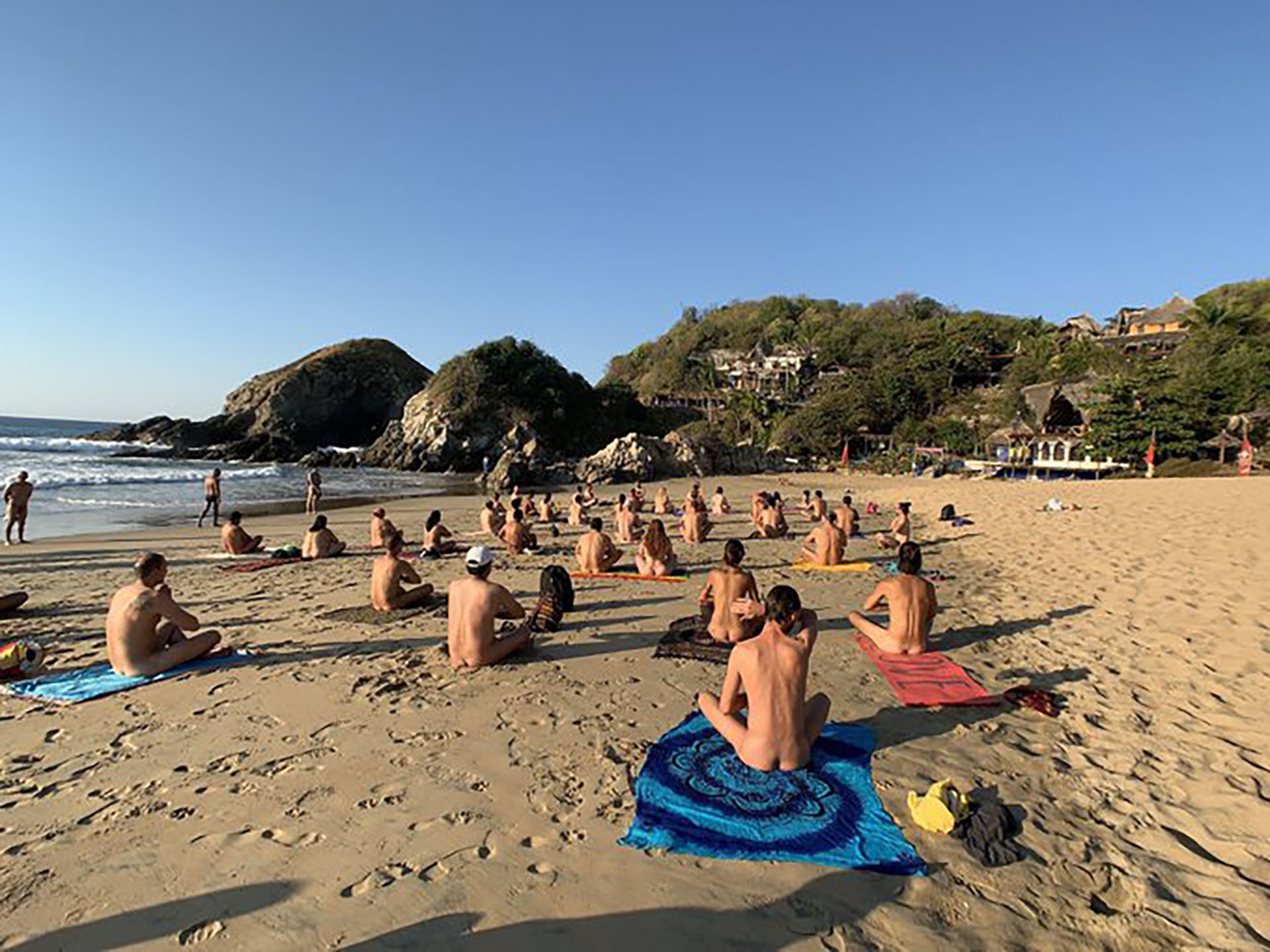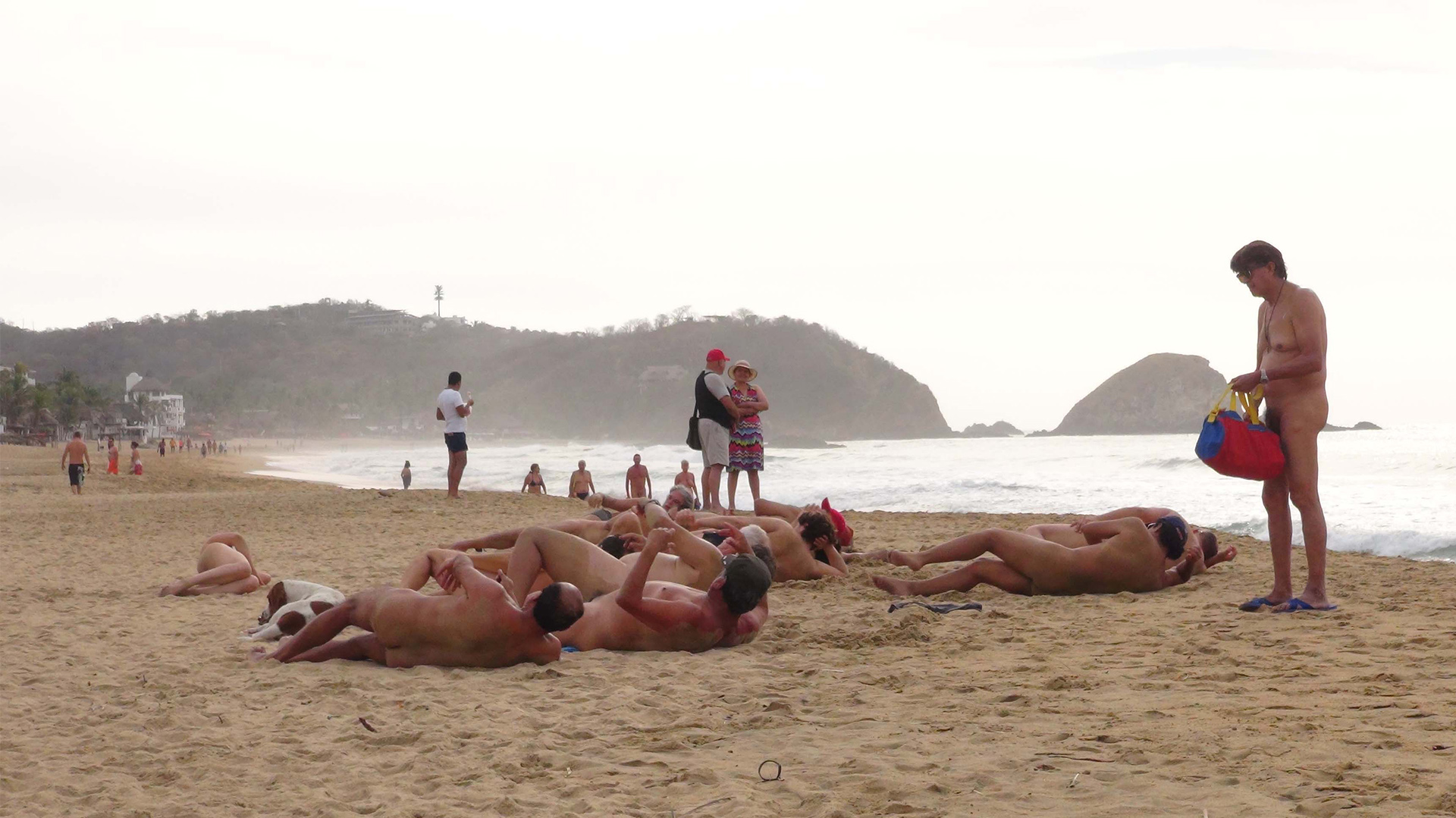Home > World > Americas
This beach in Mexico is an LGBTQ haven. But can it last?
Oscar Lopez and Lisette Poole, The New York Times
Published: 13 Apr 2022 12:18 PM BdST Updated: 13 Apr 2022 12:18 PM BdST
In an image provided by Lisette Poole, Daniel Zamora, a former drag queen turned tarot card reader, at Playa del Amor in Zipolite, Mexico, June 3, 2021. The New York Times
In an image provided by Lisette Poole, Daniel Zamora, a former drag queen turned tarot card reader, at Playa del Amor in Zipolite, Mexico, June 3, 2021. The New York Times
In an image provided by Lisette Poole, Ivanna Camarena performing as Ariana Grande in Zipolite, Mexico, May 29, 2021. The New York Times
In an image provided by Lisette Poole, Ivanna Camarena performing as Ariana Grande in Zipolite, Mexico, May 29, 2021. The New York Times
When the sun starts to slip toward the ocean in this idyllic beach town on Mexico’s Pacific Coast, a quiet migration begins. Groups of people, most of them gay men, many of them naked, amble down the beach toward a soaring rocky outcrop.
They climb a winding staircase, over the ragged cliff and down to a hidden cove known as Playa del Amor, or beach of love. As the sun becomes an orange orb, the sky turns to lilac, and the many naked bodies, Black and bronze, curvy and chiselled, are brushed in gold. When it finally dips into the water, the crowd erupts in applause.
“Playa del Amor at sunset, the first time I saw it I truly felt like crying,” said Roberto Jerr, 32, who has been visiting Zipolite for five years. “It’s a space where you can be very free.”
For decades, this former fishing village turned hippie hangout has been an oasis for the queer community, which is drawn to its golden beaches, countercultural vibe and a practice of nudism that embraces bodies of all different shapes.
But as its popularity has grown, attracting increasing numbers of gay and straight visitors, the town is starting to transform: Foreigners are snatching up land, hotels are multiplying, influencers are flocking to the beach and many residents and visitors now fear that what once made Zipolite magical could be lost for good.
“Everyone in the community should visit a place where they can feel comfortable, where they can feel free, like Zipolite,” said Jerr, who is gay. “But on the other hand, there’s also this other part, this ultramass tourism that starts to leave places without resources.”
Once a community of farmers and fishermen, Zipolite became a popular destination for European hippies and backpackers starting in 1970, when many came to the beaches of Oaxaca state for an exceptionally clear view of a solar eclipse. Hippie tourism gave the town a bohemian spirit — it’s one of Mexico’s few nude beaches — that also began attracting queer people, who were welcomed by most residents. In February, Zipolite elected the first openly gay person to head the town council.
Such tolerant attitudes are rare outside of big cities in Mexico, where conservative Catholic values persist. Despite gay marriage being legalized in more than half the country, homophobic and transphobic violence is common. Between 2016 and 2020, some 440 lesbian, gay and transgender people were killed across the country, according to Letra Ese, an advocacy group in Mexico City.
David Montes Bernal, 33, grew up a few hours from Zipolite in a conservative community where machismo and homophobia were entrenched. When he was about 9, the town priest performed what he called “practically an exorcism” to force the homosexuality out of him.
“That’s when I realised that it was a hostile place,” Bernal said.
In Zipolite, he has found a place where he can be comfortable in his sexuality and secure in his body.
“I felt a kind of hope,” Bernal said of his first visit in 2014. “Finally it seems like now there’s a place where we can be whoever we want.”
As word of this openness has spread, the town’s LGBTQ population has surged: gay bars and hotels have multiplied, rainbow flags are commonplace.
But, as accepting as many locals are, some feel that Zipolite’s identity as a laid-back town that welcomes anyone from Mexican families to Canadian retirees is being eroded, that it is transforming into a gay party town.
Miguel Ángel Ziga Aragón, a local resident who is gay himself and goes by “La Chavelona,” has watched the local economy boom, not just because of gay tourism but from a surge in tourism generally. While once hosting mostly rustic cabins and hammocks along the beach, Zipolite’s tourism scene has become what he calls “more VIP”: Beachfront suites now go for as much as $500 a night.
The growth in tourism in Zipolite reflects a statewide trend in Oaxaca: From 2017 to 2019, income from the hotel industry rose by more than one-third to nearly $240 million. In the same period, the number of tourists visiting hotels in the coastal region that includes Zipolite grew by almost 40% to about 330,000 people, according to government figures.
“It’s a change that’s good for the economy, but not so good for the community,” Ziga Aragón said.
Along with an identity crisis, many fear an environmental one. Mangroves have been built over; the wildlife is disappearing. Residents complain of a lack of running water, which could be worsened by greater development.
While most residents agree that more planning is needed, some say the transformation is inevitable.
“It’s the life cycle of every tourist destination,” said Elyel Aquino Méndez, who runs a gay travel agency. “You have to take advantage of the opportunity.”
But others fear that Zipolite could go the way of many Mexican beach towns that have become thriving resorts, like the popular gay destination of Puerto Vallarta or, more recently, Tulum. Once a bohemian paradise, the Caribbean beach of Tulum has become a lucrative real estate market filled with luxury hotels, celebrity influencers and, increasingly, violence.
Pouria Farsani, 33, who lives in Stockholm, enjoyed the combination of beautiful nature and fun partying when he first visited Tulum in 2018, but by the time he went back last September found that it felt “like a party-colonised part of Mexico.”
Farsani heard about Zipolite from some Mexican friends and visited for the first time in January 2021 — he was enchanted.
“When I’ve seen other gay scenes, it’s been very stereotypical,” he said. “What was going on here was people of all body shapes, ages, socioeconomic status, all of us could gather here.”
The body positivity in Zipolite is partly what makes the nudist beach special to many, gay or straight: For Farsani, who has alopecia, a hair-loss condition, it was particularly profound.
“I’m very happy with my body, but I’m not the Ken-doll type,” he said. “It scares people in Europe, while here my alopecia is nothing more than it makes me stand out a little more.”
Still, as Zipolite’s popularity has grown, its hippie vibe is shifting. Bars are louder, restaurants are becoming swankier. The LGBTQ tourism is changing too, becoming increasingly Americanised, less diverse.
Ivanna Camarena, a transgender woman, spent six months in Zipolite last year and met only a handful of other transgender people. “The bodies were very athletic and very masculine,” she said of the people she saw on the beach in her first few months there.
She recalled going to a nudist party that was almost exclusively gay men. “When I got there it was like ‘Wow, what is a trans woman doing here?’ Like, they were weirded out.”
Among the noticeable shifts is what has happened at Playa del Amor, which once hosted bonfires and guitar playing and now often has laser lights and DJs playing house music. People used to chat across different social groups; now, the beach has become more segregated into cliques.
The sex scene has evolved too. While visitors, including straight couples, have engaged in sex on the beach after dark for decades, in recent years it has become more brazen, with dance parties sometimes morphing into group sex in the shadows.
“Every time it’s more hedonistic, more hedonistic, more hedonistic,” said Ignacio Rubio Carriquiriborde, a sociology professor at Mexico’s National Autonomous University who has studied Zipolite for years. “Now there’s more a dynamic of constant partying.”
Many residents have grown uncomfortable, and the town council recently voted to enforce a 9 pm beach curfew to curb such activities.
“One thing is freedom and another thing is debauchery,” Ziga Aragón said. “You can have sex with whoever you want, but in private.”
For others, the concern is more environmental. Miguel Ángel López Méndez runs a small hotel near Playa del Amor, and says that revellers often leave the beach a mess. Once, while diving off the cove, he recalled seeing condoms floating “like jellyfish.”
“Everyone is free to do whatever they want with their body,” he said. “The problem is that there’s no awareness.”
For some gay men, the open sexuality of Playa del Amor is part of its power.
“From when you’re a kid, you’re forbidden from so many things: ‘Don’t be like that,’ ‘Don’t say this,’ ‘Don’t do that,’” said Bernal, who lives in the nearby town of Puerto Ángel. “Suddenly, with sex being an act of catharsis, so many things are liberated.”
Still, Bernal also worries for the future of the town, where tourism is booming, natural resources are scarce, and so many foreigners are buying up properties that the price of land has become largely unaffordable for locals.
“Everyone comes here on vacation to consume something,” he said. “A piece of the beach, a piece of your body, a piece of the party, a piece of nature.”
© 2022 The New York Times Company



